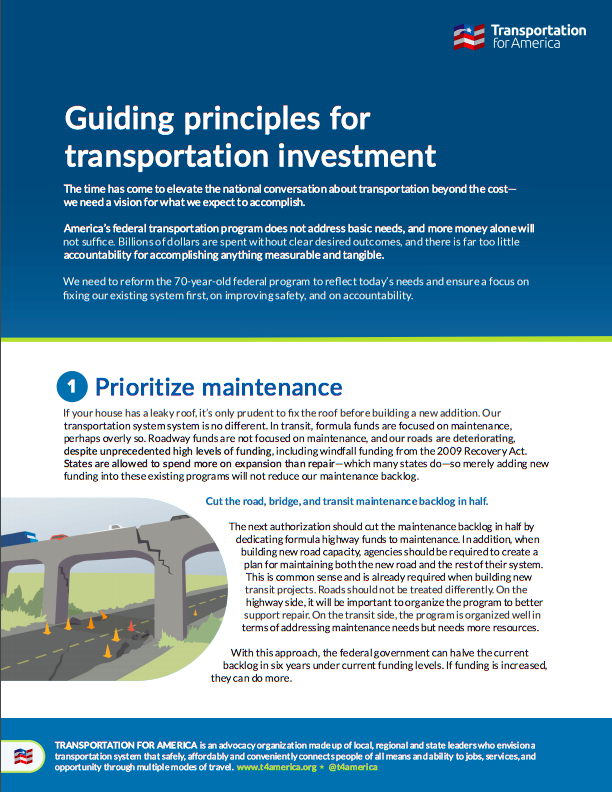Congress, transit needs at least $32 billion. Now.
Public transportation is in an unprecedented crisis, with the double whammy of falling ridership and a contracting economy crushing transit agencies’ budgets. Massive cuts to transit service are imminent if agencies don’t receive the emergency funding they need to survive. There will be no economic recovery if transit evaporates. Congress needs to #SaveTransit.
Senate Democrats recommend less driving—as Senate committee approves billions for new roads
The Senate Democrats’ Special Committee on the Climate Crisis recently released a report recommending key federal actions in each sector to avert the impacts of climate change, incorporating a number of Transportation for America’s recommendations. In fact, the very first recommendation for the transportation sector is to enable Americans to choose walking, biking, or public transportation over driving.
Will Congress hold Amtrak accountable for providing essential passenger rail service?
Communities large and small, urban and rural, are served by Amtrak’s national network of long distance routes, providing essential connections to jobs, services, and the broader economy. Amtrak is threatening to dramatically cut these services, severing essential connections despite clear directives from Congress.
Webinar recap: How the Senate’s transportation proposal would make climate change worse
Transportation is the largest source of U.S. carbon emissions, and most of it comes from driving. But a long-term transportation bill passed by a Senate committee last summer would only make this problem worse. Last week, along with Third Way, we discussed the role federal transportation policy plays in making climate change worse—and what a better transportation bill looks like.
How transit agencies are keeping workers and riders safe
As we slowly settle into a new normal, transit agencies across the country are making big changes to their operations to keep employees and riders safe. We checked in with our transit agency members across the country to see how they’re adapting to COVID-19 and what they need to keep going.
Why the Senate’s transportation bill is terrible for climate
Last summer, the Senate Environment and Public Works Committee passed a long-term transportation bill that was praised for its climate title, marking the first time the word “climate” was included in a bipartisan transportation bill. But while this climate title was worth celebrating, the bill overall would actually result in more emissions, not less. Here’s how, and why we need a different approach.
A bipartisan transportation bill isn’t always good: but it can be
Last summer, the Senate Environment and Public Works Committee passed a transportation bill lauded by both sides of the aisle. While the bill was indeed bipartisan, it does great damage to the priorities of both the Democrats and Republicans. Our director Beth Osborne explains why bipartisanship on its own doesn’t make a bill good, and how it’s possible to create a transportation bill that achieves both parties’ objectives.
Transit agencies, riders, unions, and members of Congress rally to save transit
Last week, a diverse group of transit stakeholders advocated for at least $32 billion in federal emergency funding for public transportation during a virtual rally. Scores of transit riders, transit agency executives, union leaders and members of Congress made it clear that transit won’t survive this crisis without help.
Thriving Together: A springboard for equitable recovery & resilience in communities across America
A new report—Thriving Together—takes a comprehensive look at how “we can convert our immense loss from COVID-19 and other crises into renewal.” This report represents the combined efforts of more than 100 people and organizations, including Transportation for America, to create a thoughtful guide for rebuilding a more equitable society with “all people and places thriving. No exceptions.”
Nationwide rally for emergency public transit funds in COVID-19 relief legislation
During a rally on Wednesday, four members of Congress and scores of transit riders, transit agency executives, and union representatives from coast to coast to make a powerful plea for Congress to provide at least $32 billion in emergency relief.





